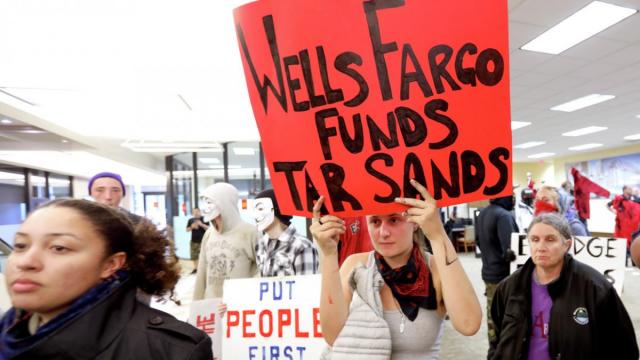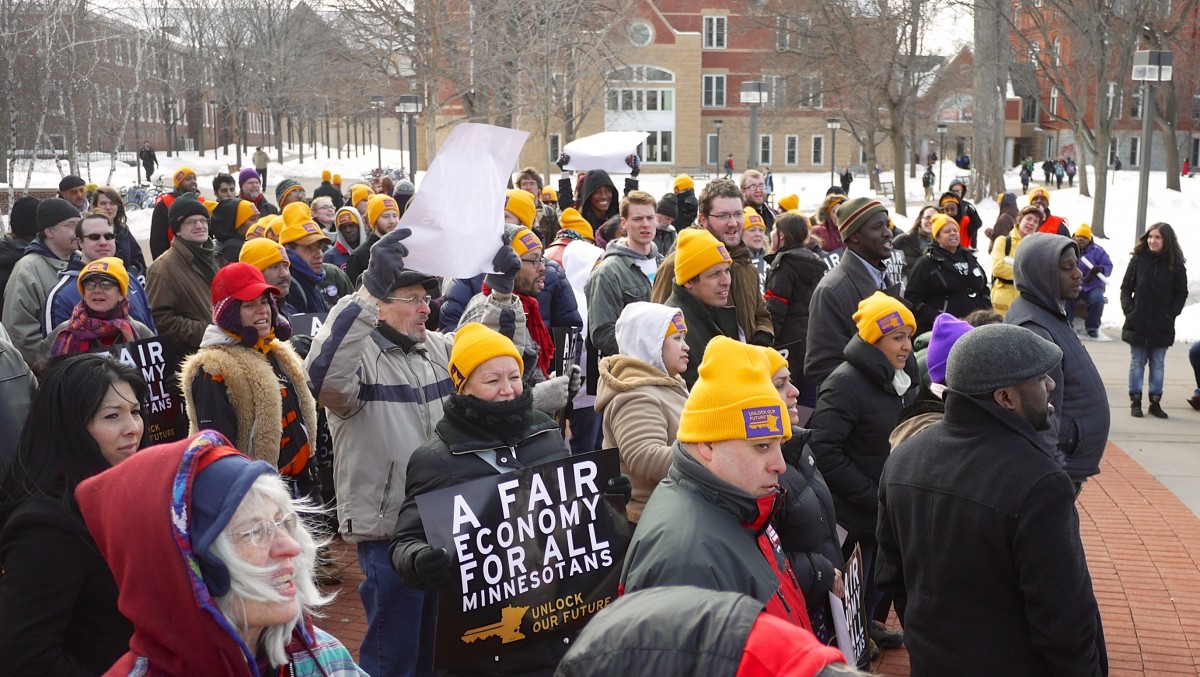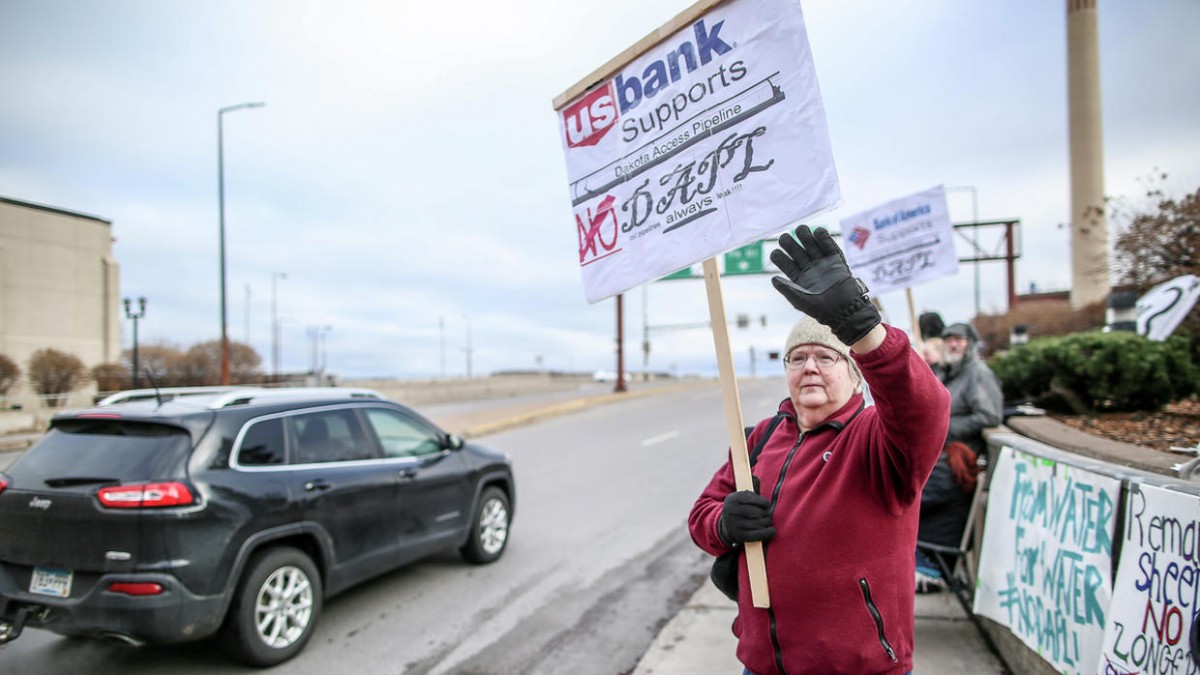
In Duluth, Minnesota, on Jan. 12, 2018, in the midst of a protest against Wells Fargo, three activists locked themselves to the entrances of the bank. Scot Bol, Michael Niemi and Ernesto Burbank blocked entry to protest the bank’s investments in Enbridge Energy Partners, a high-level fossil fuel extractor and polluter.
With a population of 86,000, Duluth still feels like a small city where people tend to know one another. The Chief of Police, Mike Tusken, knows Scot Bol personally. Just before arresting Bol for locking himself to the bank, Tusken asked whether he could convince the protester to unlock himself. Bol said no. “Well then,” Tusken reportedly said, “it’s an honor to arrest you.”
Wells Fargo and Enbridge are propping up tar sands pipelines that “carry profound hazards – jeopardizing Indigenous rights and climate stability while riding the waves of an unpredictable oil market,” writes Ruth Breech of Rainforest Action Network. Enbridge is currently pushing a 1,000-mile-long pipeline through Minnesota.
Deals like these are often shady and opaque to the public, and there’s little that local communities can do to stop multinational corporations and banks like Wells Fargo from ramming them through. The pipelines will be built despite the recent report by 13 federal U.S. agencies – in defiance of their own Chief Executive – concluding that the economic consequences of climate change will be widespread, devastating and a threat to U.S. stability. The last four years have been the hottest on record, with the 20 warmest years occurring in the last 22.
Bol, Niemi and Burbank felt they didn’t have a choice. They had to stand up and do something, and they knew that the U.S. has a rich history of nonviolent civil disobedience creating change. They carefully planned their disruptive act so that nobody would be hurt. Then they committed the act.
I can write this because, at trial, the three admitted they did it and then raised a necessity defense: that the harm of climate change significantly outweighs the harm of three people chaining themselves to a bank; that there is no alternative to breaking the law, that the dangers of climate change are imminent, and that there is a direct causal relationship between breaking the law and preventing the worsening of the climate crisis.
The City of Duluth put Bol, Niemi and Burbank on trial for three misdemeanors. Two were dropped and the defendants, through their attorneys, J.T. Haines and Jennifer McEwen, raised the necessity defense against the third, which was trespassing. I talked to Haines late last week and he told me a decision is expected by Christmas.
Haines was quick to add that the personal consequences of the verdict matter little to his clients, who will at worst be convicted of minor misdemeanors with no possible jail time and a pittance of a fine. It’s the symbolic – and ultimately the climate – stakes that are high.
The decision could hinge on whether there was a feasible “legal alternative” to civil disobedience in the struggle against climate injustice. “The [necessity] defense is basically meaningless if what that means is ‘these three people have to have engaged in all possible actions, and all possible actions have failed’” before allowing for civil disobedience, Haines said. Instead, if the court follows U.S. Supreme Court reasoning that a “reasonability” standard was more appropriate, the court may accept the necessity defense.
Haines said his legal team hopes the judge (called “the referee” in this court) knows he’s “not alone” in buying the defense. Rather, it’s a growing and well-supported strategy in response to the closure of the public sphere, as more people agitate for climate justice and scientific sensibility. The necessity defense is not an instance of courts playing “activist” or legislating from the bench, he said.
“There's certainly a history in this country of courts responding to failures in the democratic process,” Haines added. It's a classic affirmative criminal defense – and if you believe the vast majority of the world’s scientists, the imminence of the threat and the failure of current institutions to respond to it, it's not hard to understand the feelings of desperation that inspired the harmless lawbreaking.
The City of Duluth is arguing that legal alternatives existed and the defendants’ actions were not those “of a last resort.” Committing civil disobedience in hopes that “eventually, down the road,” Wells Fargo would stop lending money to fossil fuel companies doesn’t meet the elements of the necessity defense, the city has argued.
Haines said he wishes there had been more on-the-ground organizing for fundraising, communication, media support and other backup from the community during the trial. But it’s challenging to make this kind of assistance happen regularly in northern Minnesota, he said, as opposed to places back east organized by groups like the Climate Defense Project.
Indeed, this article is the first national-level media attention give to the case. Maybe that's because it's happening in a municipal court in Duluth, and the stakes for the protesters are relatively small. But the potential success of self-directed civil disobedience in localized struggles make the stakes higher than people might assume.
“I would never want someone to get arrested,” Burbank testified at trial. “But the thing is you have to come to a certain point in time where you feel like you have no other choice and you're stuck in that, and you have a child that you look at every night that you have to one day explain to them why, you know, they don’t have clean waters, so these things make – give you – no other choice but to, you know, bring awareness the best possible way you can, the most safest way you possibly can, and sometimes that includes putting your body on the line.”
You can hear my podcast interview with J.T. Haines here.
Matt Stannard is director of Solidarity House Cooperative and writes, researches, and teaches about cooperative law and economics.















